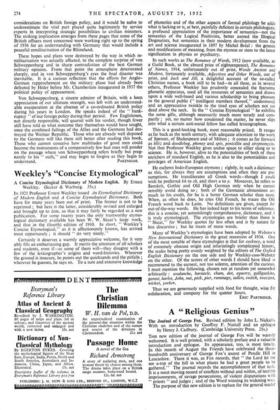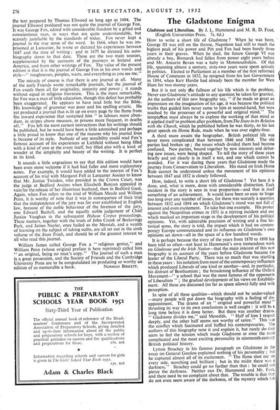A " Religious Genius "
Tins new edition of the journal of George Fox will be warmly welcomed. Is is well printed, with a scholarly preface and a valuable introduction and epilogue. Its appearance, too, is most timely. In this month of August the Friends have celebrated the three- hundredth anniversary of George Fox's ascent of Pendle Hill in Lancashire. There it was, as Fox records, that " the Lord let me see a-top of the hill in what places he had a great people to be gathered." The journal records the accomplishment of that task. It is a most moving record of conflicts without and within, of terrible imprisonments, of savage persecutions, of violent disputations with ",priests " and judges ; and of the Word winning its widening way. The purpose of this new edition is to replace for the general reader the text prepared by Thomas Ellwood so long ago as 1694. The journal Ellwood produced was not quite the journal of George Fox. It was George Fox, edited with considerable freedom by a gifted and conscientious man, in ways that are quite understandable, but scarcely justifiable by the standards of today. Fox never kept a journal in the true sense of the word. In 1664, when he was im- prisoned at Lancaster, he wrote or dictated his experiences between 1647 and the time of writing ; and in 1675 he dictated his auto- biography down to that date. These are the two main sources, supplemented by the accounts of the journeys in Ireland and America, and from other writings of Fox. The value of the present edition is that it is the journal of George Fox in his own words and style—" roughnesses, pimples, warts, and everything as you see me."
The miracle of course is that there is any journal at all. Many of the early Friends wrote remarkable journals, but the journal of Fox excels them all for originality, sincerity and power ; it stands without equal in religious literature. This is the more remarkable, for Fox was a man of little education, though this defect has probably been exaggerated. He appears to have read little but the Bible. His knowledge of grammar was poor and his spelling erratic. He yet produced a journal that is.lit up on every page by the flame from the inward experience that sustained him " in labours more abun- dant, in stripes above measure, in prisons more frequent, in deaths oft." Fox left the most earnest instructions that his writings should be published, but he would have been a little astonished and perhaps a little proud to know that one of the reasons why his journal lives is because of its style. Nobody of any sensibility could read Fox's famous account of his experiences at Lichfield without being filled with a kind of awe at the event itself, but filled also with a kind of wonder at the simplicity and beauty of the writing. It is perfect in its kind.
It sounds a little ungracious to say that this edition would have been even more welcome if it had had fuller and more explanatory notes. For example, it would have added to the interest of Fox's account of his trial with Margaret Fell at Lancaster Assizes to know that Mr. Justice Twisden, who presided in the Crown Court, was the judge at Bedford Assizes when Elizabeth Bunyan appealed in vain for the release of her illustrious husband, then in Bedford Gaol. Again, when Fox refers to the trial of William Meade and William Penn, it is worthy of note that it was in consequence of their trial that the independence of the jury was for ever established in English law, because of the noble behaviour of the foreman of the jury, one Edward Bushell, and the equally noble judgement of Chief Justice Vaughan in the subsequent Habeas Corpus proceedings. These matters, together with the trials of John Crook of Beckerings Park, and James Nayler, once hailed as the Messiah, and a wealth of learning on the subject of taking oaths, are all set out in the sixth volume of the State Trials, and should be of the greatest interest to all who read this journal.
William James called George Fox a " religious genius," and William Penn (whose original preface is here reprinted) called him " an original, being no man's copy." The journal of such a man is a great possession, and the Society of Friends and the Cambridge University Press are to be congratulated 'on producing so worthy an



































 Previous page
Previous page